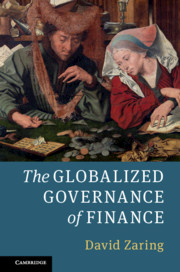Book contents
- The Globalized Governance of Finance
- The Globalized Governance of Finance
- Copyright page
- Dedication
- Contents
- Acknowledgments
- 1 A Transformative Forty Years
- 2 The Structure and Rules of the Globalized Governance of Finance
- 3 Banking, Global Oversight’s Ne Plus Ultra
- 4 Securities Regulation: Cooperation Instead of Harmonization
- 5 Cooperation in Insurance: a Slow Start, but a Fast Present
- 6 The Other Networks of Financial Regulation
- 7 International Financial Regulation and International Law
- 8 International Financial Regulation and China
- 9 The Next Financial Crisis
- Index
7 - International Financial Regulation and International Law
Published online by Cambridge University Press: 22 November 2019
- The Globalized Governance of Finance
- The Globalized Governance of Finance
- Copyright page
- Dedication
- Contents
- Acknowledgments
- 1 A Transformative Forty Years
- 2 The Structure and Rules of the Globalized Governance of Finance
- 3 Banking, Global Oversight’s Ne Plus Ultra
- 4 Securities Regulation: Cooperation Instead of Harmonization
- 5 Cooperation in Insurance: a Slow Start, but a Fast Present
- 6 The Other Networks of Financial Regulation
- 7 International Financial Regulation and International Law
- 8 International Financial Regulation and China
- 9 The Next Financial Crisis
- Index
Summary
This chapter evaluates the differences–and surprising similarities–between financial regulation, which does not count as “hard” law and international law, which does count as hard law. As it turns out, though, both depend on domestic institutions to enforce their rules, both institutions are negotiated and iterative, rather than fixed and stable, and both are best at facilitating mutually beneficial cooperation, rather than resolving zero sum disputes.Understanding how international financial regulation achieves its legitimacy through a series of domestic processes, rather than an international one gleaned from state practice and treaty commitments, provides a perspective on public international law.
Keywords
- Type
- Chapter
- Information
- The Globalized Governance of Finance , pp. 122 - 141Publisher: Cambridge University PressPrint publication year: 2019

